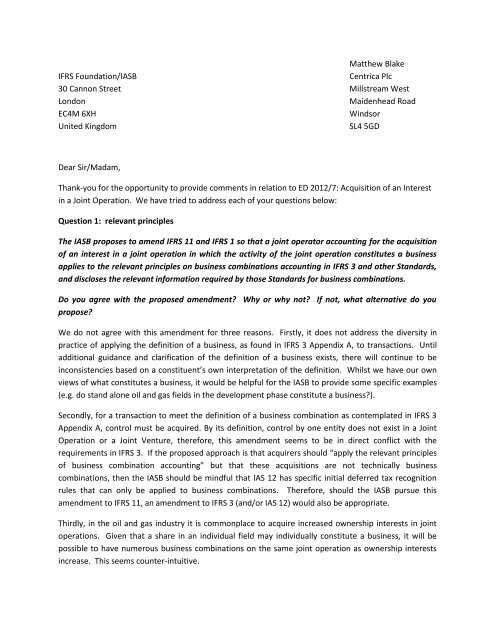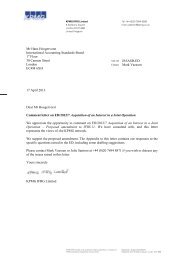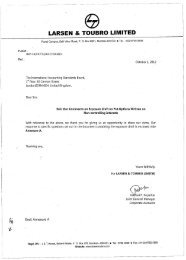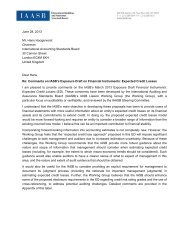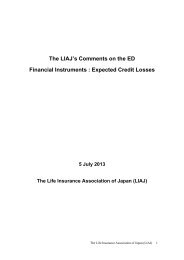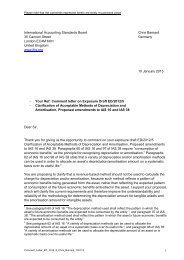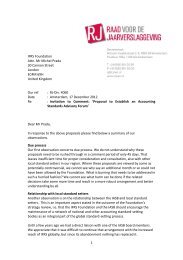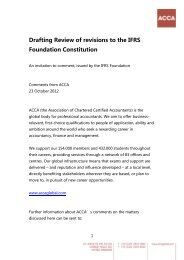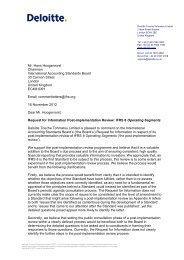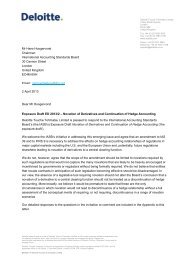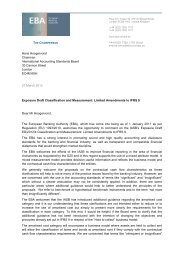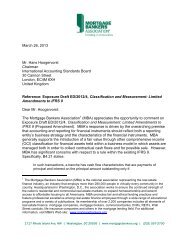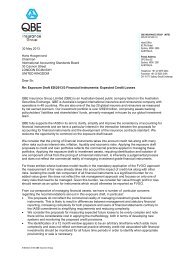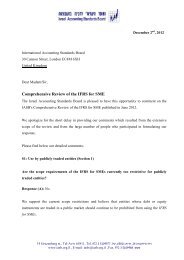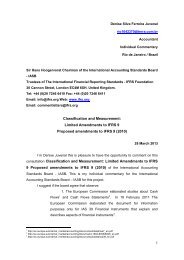Matthew Blake IFRS Foundation/IASB Centrica Plc 30 Cannon ...
Matthew Blake IFRS Foundation/IASB Centrica Plc 30 Cannon ...
Matthew Blake IFRS Foundation/IASB Centrica Plc 30 Cannon ...
Create successful ePaper yourself
Turn your PDF publications into a flip-book with our unique Google optimized e-Paper software.
<strong>Matthew</strong> <strong>Blake</strong><strong>IFRS</strong> <strong>Foundation</strong>/<strong>IASB</strong><strong>Centrica</strong> <strong>Plc</strong><strong>30</strong> <strong>Cannon</strong> Street Millstream WestLondonMaidenhead RoadEC4M 6XHWindsorUnited KingdomSL4 5GDDear Sir/Madam,Thank-you for the opportunity to provide comments in relation to ED 2012/7: Acquisition of an Interestin a Joint Operation. We have tried to address each of your questions below:Question 1: relevant principlesThe <strong>IASB</strong> proposes to amend <strong>IFRS</strong> 11 and <strong>IFRS</strong> 1 so that a joint operator accounting for the acquisitionof an interest in a joint operation in which the activity of the joint operation constitutes a businessapplies to the relevant principles on business combinations accounting in <strong>IFRS</strong> 3 and other Standards,and discloses the relevant information required by those Standards for business combinations.Do you agree with the proposed amendment? Why or why not? If not, what alternative do youpropose?We do not agree with this amendment for three reasons. Firstly, it does not address the diversity inpractice of applying the definition of a business, as found in <strong>IFRS</strong> 3 Appendix A, to transactions. Untiladditional guidance and clarification of the definition of a business exists, there will continue to beinconsistencies based on a constituent’s own interpretation of the definition. Whilst we have our ownviews of what constitutes a business, it would be helpful for the <strong>IASB</strong> to provide some specific examples(e.g. do stand alone oil and gas fields in the development phase constitute a business?).Secondly, for a transaction to meet the definition of a business combination as contemplated in <strong>IFRS</strong> 3Appendix A, control must be acquired. By its definition, control by one entity does not exist in a JointOperation or a Joint Venture, therefore, this amendment seems to be in direct conflict with therequirements in <strong>IFRS</strong> 3. If the proposed approach is that acquirers should “apply the relevant principlesof business combination accounting” but that these acquisitions are not technically businesscombinations, then the <strong>IASB</strong> should be mindful that IAS 12 has specific initial deferred tax recognitionrules that can only be applied to business combinations. Therefore, should the <strong>IASB</strong> pursue thisamendment to <strong>IFRS</strong> 11, an amendment to <strong>IFRS</strong> 3 (and/or IAS 12) would also be appropriate.Thirdly, in the oil and gas industry it is commonplace to acquire increased ownership interests in jointoperations. Given that a share in an individual field may individually constitute a business, it will bepossible to have numerous business combinations on the same joint operation as ownership interestsincrease. This seems counter-intuitive.
Our recommendation is that the <strong>IASB</strong> revisit the definition of a business in <strong>IFRS</strong> 3 and provide guidanceand clarification on application. The <strong>IASB</strong> should also consider whether it is appropriate to have morethan one business combination on the same joint operation.Question 2: scopeThe <strong>IASB</strong> intends to apply the proposed amendment to <strong>IFRS</strong> 11 and the proposed consequentialamendment to <strong>IFRS</strong> 1 on the acquisition of an interest in a joint operation on its formation. However,it should not apply if no existing business is contributed to the joint operation on its formation.Do you agree with the proposed amendment? Why or why not? If not, what alternative do youpropose?Without clarification of the definition of a business, and the amendment of <strong>IFRS</strong> 3 to remove anyinconsistencies between the two standards, this question is moot. We would agree with this in principalgiven the other recommendations made in Question 1.Question 3: transition requirementThe <strong>IASB</strong> intends to apply the proposed amendment to <strong>IFRS</strong> 11 and the proposed consequentialamendment to <strong>IFRS</strong> 1 prospectively to acquisitions of interests in joint operations in which the activityof the joint operation constitutes a business on or after the effective date.Do you agree with the proposed transition requirement? Why or why not? If not, what alternative doyou propose?We agree that any changes in regards to this matter should be applied prospectively. Retrospectiveapplication would be onerous for constituents and could require considerable restatement.We hope that these responses have been helpful to you. Please do not hesitate to contact us if youhave any further questions or would like clarification on any of the points.Yours Faithfully<strong>Matthew</strong> <strong>Blake</strong>Head of Technical Accounting<strong>Centrica</strong> <strong>Plc</strong>


